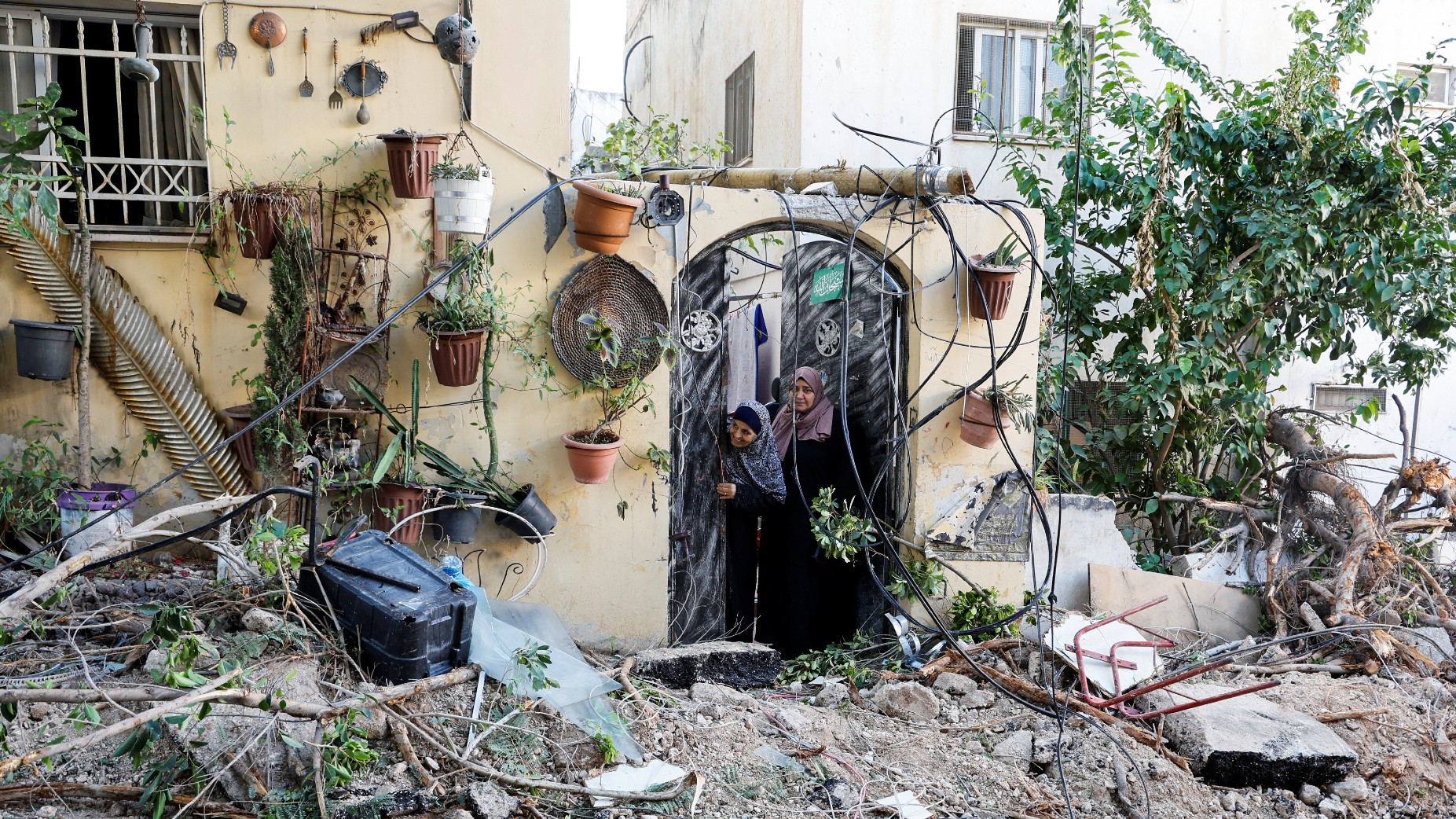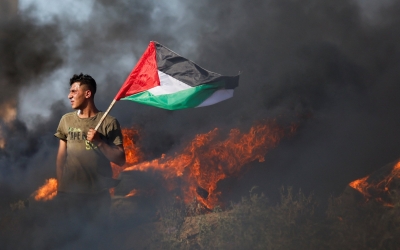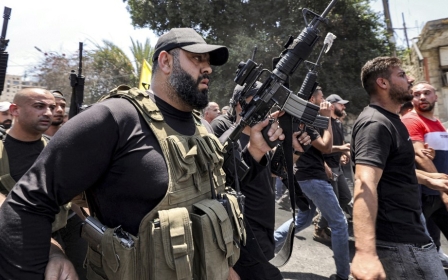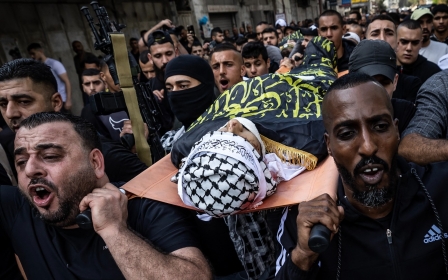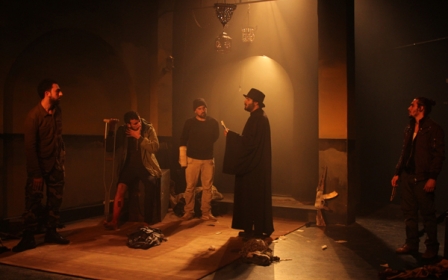Israel’s attack on the Freedom Theatre in Jenin camp is part of a cultural genocide
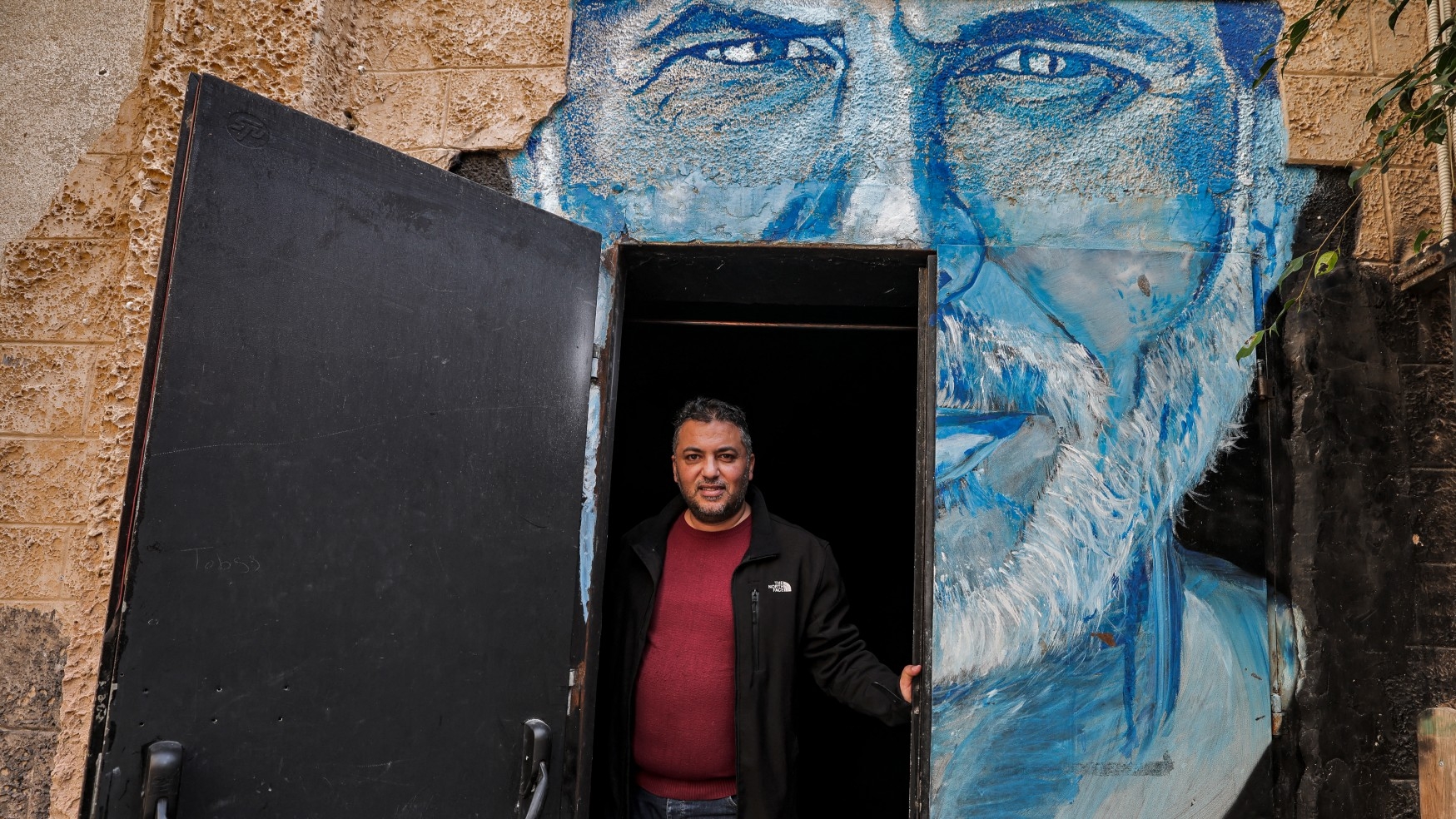
When Mustafa Shetha, a father of four and the general manager at the Freedom Theatre, was taken from his home on Wednesday 13 December and blindfolded, incarcerated, beaten, and deprived of food or water, it was not a random event.
The Israeli soldiers, who were half his age, had asked neighbours where he lived. They’d come looking for this portly, middle-aged artistic producer specifically.
Nobody would mistake Shetha, a gentle man with a fatherly demeanor, for a "terrorist". He was not a military target. They beat him up for being the general manager of a theatre. That was his crime.
But the current Israeli invasion of the Jenin refugee camp is an exercise in torture, with no military objective.
Since dawn on Tuesday, the Jenin Brigade fighters had been exchanging gunfire with the Israeli army in nearby Jenin city, leaving Jenin camp empty of armed militants.
The Israeli army took advantage of this and arrested over 500 people inside the camp, including Shetha. Around 100 people were detained, the majority of them men or youths.
Ahmed Tobasi, the creative director of the Freedom Theatre, was one of them.
He confronted the soldiers on Wednesday, asking why they were attacking the theatre. They beat him, and raided his home, smashed his computer, his iPad, and plants, before arresting him.
Tobasi is no stranger to Israeli brutality. He says his earliest memory was being kicked by an Israeli soldier when he was a child, hiding in the alleyway next to his humble home. He was also arrested as a youth.
But then Juliano Mer Khamis, who founded the Freedom Theatre, which Tobasi now leads, took him under his wing and gave him work in the theatre.
It was this work that gave Tobasi the chance to travel to Norway, where he lived, worked, and attained Norwegian citizenship.
But it was his courage and sense of cultural pride that brought him back to Jenin Camp and ultimately led to him being singled out by Israeli troops and given the beating this week that left bruises on his legs and back.
These wounds are a visceral acknowledgment of his ability to inspire hope and dreams in the youth of Jenin.
Fearing Palestinian pride
Jamal Abu Joas was also arrested and detained by soldiers who were beating detainees and calling them "sons of whores" in Arabic. A nice touch.
Abu Joas is one of the theatre’s trainers for the younger members, and he was part of the summer camp teaching crew.
'These savage attacks directly target everything that enhances national and cultural consciousness'
- Haneen Ameen, Palestinian Authority’s Ministry of Culture
Not a dangerous guy, unless your fear is the social cohesion of a community under siege, and passing on a sense of self, continuity, and Palestinian pride.
If this is what you fear, it makes sense to beat up and incarcerate this sensitive, kind young poet, whose nerves are now shot, and who smokes a lot of cigarettes to help him deal with what is now behind his sad eyes and shy smile.
Abu Joas was severely beaten and his camera and phone were stolen.
“Numerous homes in the camp, including those belonging to individuals working in the cultural field, were raided,” says Haneen Ameen, director of the Palestinian Authority’s Ministry of Culture.
"These savage attacks directly target everything that enhances national and cultural consciousness, through the creative role played by these institutions and individuals, contributing to the enhancement and narration of the Palestinian story, in the voices of its people, and preserving national identity through their arts and culture."
The electricity, water, and internet were cut off days ago. The roads have been destroyed again by modified Caterpillar bulldozers, known as D9s.
I was in Jenin Camp back in July, a few days after the major attacks of 3 and 4 July, when 1,000 Israeli soldiers invaded and the skies were strewn with warplanes, rockets, and drones.
Military dogs were sent into refugees’ homes, along with tear gas grenades. The constant rattle of gunfire was all around and sounded like raindrops.
Psychological war
For weeks, the roads remained denuded of their tarmac, waiting for the Palestinian Authority to patch up the broken pipes and snapped wires, to repave the blacktop surface that allows kids to be driven to school, and ambulances to make it to the hospital in time.
This is one reason why their surface is yet again destroyed, and everyone’s hearts are breaking.
There’s certainly a practical reason for destroying stuff - it makes life hard. Breaking roads means less movement.
But it’s not only about this. In fact, I’d suggest it’s more about the psychological aspect of war.
It’s about making the camp’s residents feel powerless. It’s about making them give up, and move to Jordan.
And what could be more demoralising than smashing the internal walls of a much-loved theatre with mallets? Than blindfolding the theatre staff in front of their families? Handcuffing them? And shooting rapid rounds of live ammunition inside the theatre itself? All while it’s around 16 degrees outside, and raining.
Surprisingly perhaps, there’s a good answer to this rhetorical question, and it turns out that there were other ways Israeli forces could find to break the Palestinian spirit: blasting recordings of Hannukah songs over the tannoy system of the main mosque in the centre of Jenin refugee camp while soldiers spray the Star of David onto residents’ homes and hang Israeli flags on their buildings.
"This is the ugliness of the occupation," says Momen Sadi, an actor and educator at the Freedom Theatre’s school. "The occupation encroaches on our property, works on westernisation, and sings disgusting songs.”
Nothing shouts "coloniser" like a flag on a post, especially when paired with these acts of cultural genocide, defined in the Hague Convention, Roerich Pact, and World Heritage Convention, all flagrantly broken and bruised, alongside the bones and bodies of my colleagues and friends.
“Mina, it’s terrifying,” wrote my friend Wafa, a 26-year-old mother and home-maker whose husband is unemployed as a direct result of the violence, and whose one-year-old has not been able to access formula milk for weeks and is no doubt now undernourished.
"My children are terrified by the sound of the roaring and the screaming. Our neighbourhood is full of soldiers. My husband is very nervous, they say they [Israeli troops] beat them until they faint."
Her husband was subsequently detained by the Israelis.
This feels like a moment to mention the fate of the much-loved horse sculpture that lived by the gate to the camp, which was taken hostage by the Israelis. And the giant arched gates that framed the entrance on the other side, which have now been ruined in this depraved orgy of cultural destruction.
Punishing the resistance by attacking a monument and abducting the horse as a hostage.
This is what oppression looks like, visually. Like broken bits of horse statues.
Eradicating a culture
It’s like Lord of the Flies, but the soldiers let loose on this refugee camp have only a general idea of what they should be doing.
There’s a list of people to arrest - Ahmed, Jamal, Mustafa - and a list of buildings to vandalise. But the exact methodology for this is left to disturbed, violent teenagers with automatic weapons who roam the dark alleys, which have no electricity to light them beyond their military, high-tech accessories.
It’s about eradicating a culture. But you can’t erase the collective yearnings and communal memories of a people, simply by blowing it up
It’s Clockwork Orange, but Jewish.
You can’t erase the collective yearnings and communal memories of a people, simply by blowing it up
Their targets are non-combatants. They are mothers, dads, kids, the elderly. So, why the tear gas, incessant low-flying drones, and bulldozers? Why the warplanes dropping air-to-land missiles, and the Energa anti-tank grenades, with the super loud booms that haunt my dreams, from the first time I heard them in Jenin, to the last time I heard them in Nablus. (They sound similar to the Vogon Constructor Fleet, if you know Hitchhiker’s Guide to the Galaxy.)
The rumour was that this siege would last five more days, like the siege in the Second Intifada, when Jenin camp was etched into the pages of history.
In the first 72 hours, at least 12 men were killed, and one young boy, Bashar Hourani, whose voice hadn’t yet dropped.
The 12th to die was a student at the Freedom Theatre, 16-year-old Musa Ibn Malak, a joyful, shy boy whose mother is a dear friend. She stayed with me along with Musa's younger brother and sister during the Israeli invasion of Jenin camp in September.
For as long as Palestinians are in their land, they will continue to make art and culture. Arresting the cultural leaders in Jenin camp today does nothing to keep Israelis safe, but it does recognise how the cultural practices of a society are its glue, and why this threatens Israel.
It’s a back-handed compliment to the power of theatre and the arts in general, and specifically the power of the Freedom Theatre in Jenin camp, and the Youth Social Center also, which was set on fire.
The Freedom Theatre is part of the extraordinary network of theatres and cultural organisations throughout the West Bank and Gaza that defend Palestine’s emotional, psychological, spiritual, and cultural values with plays, poems, painting, and performances.
This attack shows how simple grassroots organisations frighten the world’s fourth most powerful nuclear-military machine, and why the Freedom Theatre deserves the support of every international theatre and arts institution that believes - to quote Nina Simone - that "an artist’s duty... is to reflect the times''.
The views expressed in this article belong to the author and do not necessarily reflect the editorial policy of Middle East Eye.
This article is available in French on Middle East Eye French edition.
Middle East Eye propose une couverture et une analyse indépendantes et incomparables du Moyen-Orient, de l’Afrique du Nord et d’autres régions du monde. Pour en savoir plus sur la reprise de ce contenu et les frais qui s’appliquent, veuillez remplir ce formulaire [en anglais]. Pour en savoir plus sur MEE, cliquez ici [en anglais].


